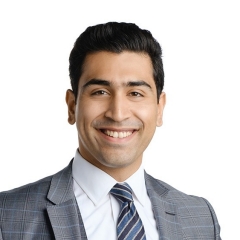Political Science (BA)
Virtual information sessions
Discover what makes Concordia's Faculty of Arts and Science stand out as a leader in the humanities and social and natural sciences, including academic opportunities, hands-on learning and how to achieve your goals.
Why study Political Science?
Political Science teaches you about the ways that history, ideas, systems and structures give rise to power and authority. By learning to think critically about relationships of power, you’ll be well-placed to contribute to the public life of your country and the world. Political Science is one of the most popular degree choices at Concordia, with a student body among the most diverse and politically aware in Canada. You’ll find yourself sharing ideas with classmates whose backgrounds represent cultures and political systems from around the globe. You’ll gain insights from prominent national and international academic guest lecturers, as well as politicians and ambassadors.
Choose courses from these groups:
- International Politics
- Comparative Politics
- Canadian and Quebec Politics
- Public Policy and Administration
- Political Theory
Program highlights
- Attend Workshops on Social Science Research throughout the year, featuring visiting scholars and in-depth discussions of a range of topics in the field
- Regular visiting speakers including leading Canadian political figures and influential policymakers
Special funding for out-of-province students
Up to $4000 for undergraduate programs.
Program structure
A Bachelor of Arts degree takes a minimum of three or four years (90 – 120 credits) of full-time study, depending on your academic background.
Program options
- Honours in Political Science (60 credits)*
The Honours Program in Political Science is designed for students with a strong academic background who wish to develop a solid and articulated understanding in political science and who want to acquire an early preparation for graduate studies. In addition to offer a comprehensive undergraduate training in the main fields of political science (Canadian Politics, Comparative Politics, International Relations, Political Theory, and Public Policy), the Honours Program in Political Science provides students with a greater emphasis on training in research methodology, epistemology and political theory, key skills for graduate studies. - Major in Political Science (42 credits)
The Major Program in Political Science is designed for students who wish to develop a solid and articulated understanding in political science. It offers a comprehensive undergraduate training in the main fields of political science: Canadian Politics, Comparative Politics, International Relations, Political Theory, and Public Policy. - Minor in Political Science (24 credits)
The Minor Program in Political Science is designed for students who wish to acquire basic understanding in political science to complement their training in another discipline. The Minor Program in Political Science provides the opportunity to discover the main fields of political science: Canadian Politics, Comparative Politics, International Relations, Political Theory, and Public Policy. By its diverse and broad training, the Minor Program in Political Science offers complementary training for a wide range of social sciences and humanities programs. It is particularly relevant for students completing another program in one of the following disciplines: sociology, economy, business and psychology.
The requirements to add a minor in Political Science are: a) at least 24 credits completed at Concordia, b) a GPA of at least 2.0. If you fulfill all of the above criteria, and wish to add a Minor to your program pick up a Change of Concentration form from Reception and make an appointment to see the one of the Department's Academic Advisors. You must bring a copy of your current transcript with you. - Minor in Human Rights Studies (24 credits)
*Honours is a highly concentrated program, ideal for students planning to continue to graduate studies. If you are interested in Honours, speak with your program advisor in your first year of study at Concordia. Students applying to the University are able to apply to the major.
Courses
Co-op program
The Co-op program gives academically strong students a chance to bridge university life and the working world by completing paid work terms. Co-op work terms make it possible for you to work in:
- Policy evaluation and analysis
- Comparing and evaluating corporate social responsibility policies, including tracking news stories about a corporation or government to assess the public’s reception of policies and actions
- Analyzing government regulation on a theme or topic across countries or time
Internship
Students with a minimum of 27 credits completed and a GPA of 3.3 or above have the option of participating in an internship placement in either the public or private sectors. Normally students secure a relevant internship on their own, however, they are welcome to consult and receive guidance from the Internship Coordinator. Internships offer an exciting opportunity to gain valuable work experience and build career networks while receiving credit. The internship can be taken during any semester (Fall, Winter, Summer).
United States students: A U.S. Federal Student Aid-eligible version of this program is offered. This version meets all U.S. regulations (such as no co-operative education or e-courses) for eligible programs.
Admission criteria
Minimum cut-off averages and course requirements
- Quebec CEGEP: 21
- High School: C+
- ACT or SAT is NOT required
- Canadian curricula course requirements
- Accepted international qualifications
- International Baccalaureate (IB) diploma: 26
- International Baccalaureate Career-related Programme (CP): 26
- Baccalauréat français: 11
- British system of education (GCE):
- A-levels: At least two A-level exams CD or
- AS-levels: At least 4 AS-level exams with equivalent results or
- BTEC: Level 3 Diploma or Extended Diploma in a related subject area with equivalent results
- Additional information for British System of Education (GCE) applicants
- University Transfers (internal/external): C
Minimum cut-off averages should be used as indicators. The cut-off data may change depending on the applicant pool. Applicants who meet the stated minimum requirements are not guaranteed admission to these programs.
Application deadlines
It’s not too late to apply
Most undergraduate programs are still accepting applications for fall 2025.

FALL ENTRY (September)
Deadline: March 1
International applicants: Apply no later than February 1 to allow time for immigration document processing. However, applying earlier is strongly recommended. Immigration processing times vary by country, and delays could prevent you from starting your studies on time.

WINTER ENTRY (January)
Deadline: November 1
International applicants: Apply no later than August 1 to allow time for immigration document processing. However, applying earlier is strongly recommended. Immigration processing times vary by country, and delays could prevent you from starting your studies on time.
We reserve the right to close admission to a program at any time after the official deadline without prior notice.
After your degree
Political Science graduates have established careers in fields such as:
- Domestic and international law
- Public administration
- Political campaigning
- Public opinion research
Many have gone on to complete graduate degrees and pursue careers in domestic and international NGOs and the United Nations.
Student stories

Hussain Shorish
Major in Political Science Major in Journalism Public Policy & Public Administration - Internship OptionHussain Shorish advocates for clients at the federal, provincial and municipal level.

Rutvi Ajmera
Honours in Philosophy Major in Political Science
I developed the ability to identify where information comes from and to think about how we receive it.
Other programs of interest

When you study public policy analysis, policy advocacy and community economic development, you’ll graduate ready to jump into in the policy-making process in private, public, and community sectors.
Department
School of Community and Public Affairs
Faculty

Philosophers reflect on some of the world’s most serious problems: the basis of ethical action, human rights, global justice or our relationship with the environment.
Department
Faculty

A liberal arts education equips you for life. The Liberal Arts program teaches you to think critically, enhance your communication skills and become a more resourceful, innovative and self-confident person.
Department
Faculty


